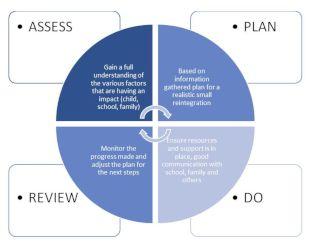The getting help stage
Where risks of emotionally based school non-attendance are identified, it is important to gather further information from the child or young person, families and school staff involved and put in place strategies to support them as soon as possible. Fast action can prevent emotionally based school non-attendance from becoming entrenched and result in much better outcomes.
This stage should involve also gaining the view of professionals and agencies that are currently involved in supporting the child or young person and family but can also incorporate making referrals to other support agencies to help in the identification of needs and targeted intervention planning e.g. SISS services.
The Solihull EBSN guidance advocates that schools should follow thorough assess, plan, do and review cycles with the child or young person at the centre of the planning and interventions.
Following the gathering of information from the child or young person, family, school and other professionals involved it is important that ‘sense’ is made of it. In other words, an overview of the whole picture where various factors are obtained and potential formulations or hypotheses regarding the behaviour are formed. These should then inform the intervention and return to school support plan.
In order to understand the cause of EBSA, professionals must consider the child or young person’s underlying needs and how these may be contributing towards their presenting behaviour. It can be helpful to consider what the function of the behaviour is and what it may be communicating. Try to separate behaviours from feelings and underlying needs.
Getting more help
Referral to a psychological service or support service.
Educational psychology
Educational Psychologists (EP) work both for local authorities and privately across the country. They are trained to post graduate level and may specialise in certain areas. Most schools will have a link EP they work with regularly.
An EP would seek to work with the child or young person, families, educational settings and other professionals already involved to develop and psychological formulation of the EBSN functions, which may be gained through further assessment (including observations, consultations and individual assessment work).
Inclusion Service
This is a team of education specialists who support children and young people with attendance difficulties. They provide training to schools and work directly with families.
Specialist Inclusion Support Service
SISS is a large team of teachers and teaching assistants who specialise in supporting children and young people with additional needs. They are split into several teams covering mental health, learning, disability, communication, autism and early years. The service also runs an additional resource provision for pupils with emotional wellbeing needs and provides training to school staff.
Educational Psychology
Educational Psychologists (EP) work both for local authorities and privately across the country. They are trained to postgraduate level and may specialise in certain areas. Most schools will have a link EP they work with regularly.
An EP would seek to work with the child or young person, families, educational settings and other professionals already involved to develop a psychological formulation of the EBSN functions, which may be gained through further assessment (including observations, consultations and individual assessment work).
Getting more help
Referral to a psychological service or support service (eg SOLAR).

